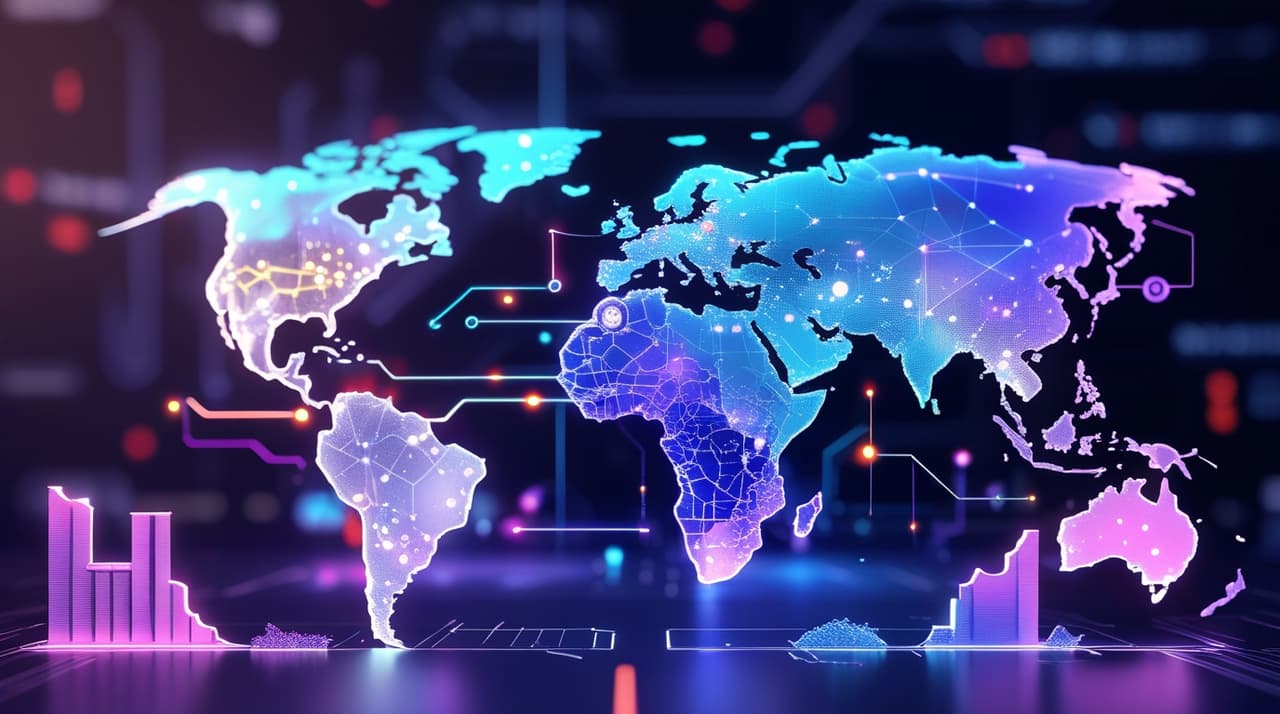On a quiet Sunday morning, I was sipping coffee when I received an alert about new tariffs imposed by the U.S. on Chinese technology goods. It’s amazing how one decision can send ripples through the stock market and change the landscape of global tech. Let’s dive into what’s happening and why it matters today.
Understanding the Latest Tariff Actions
The trade relationship between the U.S. and China is like a game of chess. One wrong move can lead to a cascade of retaliatory actions. Recently, the stakes have risen significantly. The U.S. has imposed a hefty 50% tariff on Chinese electric vehicles (EVs), effective May 15. This bold move is not just about cars; it’s a signal of escalating tensions in the tech and trade war.
U.S. Tariff on Chinese Electric Vehicles
Let’s break this down. A 50% tariff means that if a Chinese EV costs $30,000, the price tag for U.S. consumers could jump to $45,000. Ouch! This is a significant increase that could deter buyers. The goal? To protect American manufacturers and encourage consumers to buy domestic products.
- Impact on Consumers: Higher prices for EVs could lead to decreased sales.
- Impact on Manufacturers: Companies like Tesla, which has a factory in Shanghai, may face production cuts. Reports suggest a 30% drop in production from this factory.
But what does this mean for the future? Will American consumers turn to domestic options, or will they seek alternatives from other countries? It’s a tough call.
China’s Retaliation
In response to the U.S. tariffs, China has made a bold move of its own. They have banned the export of rare earth metals to U.S. defense contractors. Rare earth metals are crucial for many technologies, including smartphones and electric vehicles. Without these materials, U.S. defense firms could face significant production delays.
- Why Rare Earth Metals Matter: These materials are essential for high-tech manufacturing.
- Potential Consequences: This ban could hinder U.S. military capabilities and innovation.
Is this a strategic play by China? It certainly seems like it. By targeting defense firms, they are sending a clear message: “We can play this game too.”
New Additions to the U.S. Entity List
As if the situation couldn’t get any more complicated, the U.S. has added twelve Chinese tech firms to its Entity List. This means these companies will face restrictions on their ability to do business with U.S. firms. The implications are enormous.
- Who’s Affected? Major players in the tech industry are now in the crosshairs.
- Escalating Tensions: This move only heightens the already fraught relationship between the two nations.
What does this mean for innovation? With restrictions in place, collaboration between U.S. and Chinese firms may dwindle. This could slow down technological advancements on both sides.
Looking Ahead
As we navigate these turbulent waters, it’s essential to keep an eye on the broader implications. The U.S. and China are not just fighting over tariffs; they are battling for technological supremacy. The outcome of this trade war could reshape the global tech landscape for years to come.
In the end, we must ask ourselves: Who will emerge victorious in this ongoing saga? Will it be the U.S. with its protective tariffs, or China with its strategic responses? Only time will tell.
Who's Getting Crushed in the War
The ongoing U.S.-China tech trade war is hitting some major players hard. As we dive into the latest developments, it’s clear that the effects are rippling through the tech industry. Let’s break down who’s facing the brunt of this economic conflict.
Tesla's Production Downturn
First up is Tesla. The company has reported a staggering 30% production downturn at its Shanghai plant. This isn’t just a minor hiccup; it’s a significant drop that could impact their overall output and sales. Why is this happening? The new tariffs imposed by the U.S. on Chinese goods are making it more expensive for Tesla to operate. The company relies heavily on its Shanghai facility to produce vehicles for both the Chinese market and for export.
Imagine trying to run a marathon, but suddenly, your shoes are too tight. That’s what Tesla is experiencing. The company is now forced to rethink its strategies. Will they shift production to another location? Or will they absorb the costs and hope for a rebound? Only time will tell.
NVIDIA's Financial Losses
Next, we have NVIDIA. This tech giant has lost a whopping $4 billion in orders for data centers in China. That’s not pocket change! With the increasing restrictions and tariffs, many companies are pulling back on their investments in technology from the U.S. This is a huge blow, especially since NVIDIA has been a leader in graphics processing units (GPUs) and AI chips.
Think of it this way: if you were a chef, and suddenly all your suppliers were cut off, how would you keep your restaurant running? NVIDIA is facing a similar dilemma. The company needs to find new markets or adapt quickly to survive. The question is, can they pivot fast enough to mitigate these losses?
Apple's Price Hike
Finally, let’s talk about Apple. The tech giant is facing a $200 increase in the price of its new iPhone 17 Pro Max. This price hike is a direct result of the tariffs and increased production costs. Apple has always been known for its premium pricing, but this could push some consumers away. Will people still be willing to pay top dollar for the latest tech, or will they seek alternatives?
It’s like going to a fancy restaurant and suddenly finding out that your favorite dish has doubled in price. You might think twice before ordering it again. Apple needs to tread carefully here. They’ve built a loyal customer base, but loyalty can wane when prices rise.
What Does This Mean for the Future?
In summary, the U.S.-China tech trade war is creating significant challenges for major companies. Tesla, NVIDIA, and Apple are all feeling the pressure. As they navigate these turbulent waters, it’s essential to keep an eye on how they adapt. Will they innovate? Will they find new markets? Or will they struggle to maintain their positions?
The stakes are high, and the outcomes are uncertain. But one thing is clear: the tech landscape is changing rapidly, and we’re all watching closely.
The Unexpected Winners of the Trade War
The ongoing U.S.-China trade war has created a complex landscape for businesses and consumers alike. While many companies are feeling the pinch, some are surprisingly thriving. Let’s dive into the unexpected winners of this economic tussle.
1. U.S. Chipmakers: Intel and Micron
One of the most notable beneficiaries of the trade war is the American semiconductor industry. Companies like Intel and Micron are gaining significant market share. How did this happen? With reduced competition from Chinese firms, these U.S. chipmakers are stepping up to fill the void.
As tariffs on Chinese technology products increase, U.S. companies are finding it easier to attract customers who are looking for reliable alternatives. According to a recent update, "Intel & Micron are gaining market share" as they capitalize on this situation. This shift is not just a temporary win; it could reshape the semiconductor market for years to come.
2. Manufacturing Moves to Vietnam and Mexico
Another surprising outcome of the trade war is the surge in manufacturing activities in Vietnam and Mexico. Many companies are relocating their production facilities to these countries to avoid hefty tariffs on goods imported from China. This trend is not just about saving money; it’s also about diversifying supply chains.
Why is this important? When companies move production closer to their consumers, they can respond more quickly to market demands. This agility can be a game-changer in today’s fast-paced economy. As a result, we see a boom in manufacturing jobs and economic growth in these regions.
- Increased investment in local infrastructure.
- Job creation in manufacturing sectors.
- Stronger trade relationships with the U.S.
As businesses make these shifts, it raises an interesting question: Will this trend continue even after the trade war subsides? Only time will tell.
3. European Carmakers Reap Benefits
European car manufacturers are also finding a silver lining in the trade war. With increased tariffs on Chinese competitors, brands like Volkswagen and BMW are seeing a boost in their market share. The tariffs make it more expensive for Chinese electric vehicle (EV) manufacturers to sell in Europe, leveling the playing field for European automakers.
It’s fascinating to see how a trade war can shift the dynamics of an entire industry. As one source notes, "BYD & NIO hit with EU tariffs too," which means that European companies can now compete more effectively against these Chinese giants.
What Does This Mean for Consumers?
For us, the consumers, this could mean a wider variety of products and potentially better prices from U.S. and European manufacturers. However, it also raises concerns about the long-term implications of these shifts. Will we see a decrease in innovation as companies focus more on market share than on developing new technologies?
In conclusion, while the trade war has created challenges for many, it has also opened doors for unexpected winners. From U.S. chipmakers to European car manufacturers, the landscape is changing. As we navigate this complex situation, it’s essential to keep an eye on these developments and understand their broader implications.
What Lies Ahead: Key Dates to Watch
The world of tech and trade is changing rapidly. As we look ahead, there are some key dates that could significantly impact the landscape. Let’s break down what’s coming up and why it matters.
1. May 1: The TikTok Decision
On May 1, we will see a crucial decision regarding TikTok. The U.S. Treasury is set to announce whether it will ban the popular app. This is not just about social media; it’s about national security. The U.S. government has expressed concerns over data privacy and potential foreign influence.
Imagine a world where your personal data is at risk. That’s the fear driving this decision. If the ban goes through, it could change how millions of Americans interact online. TikTok has become a cultural phenomenon, and its absence would leave a significant void.
2. May 10: Anticipated Retaliation from China
Just days later, on May 10, we expect China to respond. The focus will be on major American companies like Boeing and Qualcomm. China has a history of retaliating against U.S. actions, and this time may be no different.
- Boeing: Could face restrictions on sales or increased tariffs.
- Qualcomm: May see challenges in its supply chain or market access.
Why is this important? Well, these companies are not just tech giants; they are integral to the U.S. economy. A hit to their operations could ripple through the market, affecting jobs and investments.
3. June: Potential Biden-Xi Emergency Talks
Looking further ahead, we have the possibility of emergency talks between President Biden and President Xi in June. This could be a game-changer for U.S.-China relations.
Why should we care? These discussions could reshape future trade relations. If both leaders can find common ground, it may ease tensions and lead to a more stable economic environment. But if talks fail, we could see further escalation.
It’s like a high-stakes chess game. Each move could have significant consequences. Are we prepared for what’s next?
Conclusion
As we approach these key dates, it’s essential to stay informed. The decisions made in the coming weeks could have lasting effects on the tech industry and beyond. Whether it’s a TikTok ban, retaliation from China, or high-level talks between leaders, we are on the brink of significant changes.
Let’s keep an eye on these developments. The future is uncertain, but being aware of these key dates can help us navigate the complexities of the tech trade war.
Conclusion: Navigating a New Era in Global Tech
As we stand on the brink of a new era in global technology, one thing is clear: adaptability is key. The tech landscape is shifting rapidly. Just look at the recent developments in the U.S.-China trade war. With tariffs soaring and new restrictions being imposed, companies are feeling the pressure. It’s like trying to navigate a ship in a storm—one minute, the waters are calm, and the next, you're battling fierce waves.
So, what does this mean for us? For businesses, it means being ready to pivot at a moment's notice. For consumers, it means staying informed about how these changes might affect our daily lives. The tech environment is not just changing; it's evolving at a pace that can be hard to keep up with.
The Importance of Adaptability
Adaptability is no longer just a buzzword; it’s a necessity. Companies that can quickly adjust their strategies will thrive. For instance, U.S. firms like Intel and Micron are already gaining market share as they capitalize on the challenges faced by their Chinese counterparts. Meanwhile, Tesla's production in Shanghai has dropped by 30%. This stark contrast highlights how adaptability can make or break a business in today's climate.
But how can we, as individuals and businesses, cultivate this adaptability? Here are a few strategies:
- Stay informed: Knowledge is power. Regularly check reliable news sources to keep up with the latest developments.
- Embrace change: Instead of resisting change, look for opportunities within it. Can your business pivot to meet new demands?
- Network: Connect with others in your industry. Sharing insights can lead to innovative solutions.
Future Predictions for the Tech Sector
Looking ahead, the tech sector is likely to face more turbulence. Trade tensions will continue to shape the landscape. As tariffs rise, companies will need to reassess their supply chains and market strategies. For instance, the recent ban on rare earth metal exports from China to U.S. defense contractors could lead to significant shifts in production and innovation.
Moreover, we might see a rise in tech manufacturing in countries like Vietnam and Mexico. These regions are poised to become new hubs for tech production, offering alternatives to traditional powerhouses. This shift could lead to a more diversified global tech landscape, which might be beneficial in the long run.
Staying Informed on Global Trends
As we navigate this new era, it's crucial to stay informed about global trends and their local impacts. What happens on the global stage can have a ripple effect in our communities. For example, rising prices for products like the iPhone 17 Pro Max due to tariffs will affect consumers directly. We need to ask ourselves: how can we prepare for these changes?
In conclusion, the tech world is in a constant state of flux. By embracing adaptability, keeping an eye on future trends, and staying informed, we can better navigate the challenges ahead. The tech landscape may be unpredictable, but with the right mindset, we can turn challenges into opportunities. Let's stay engaged and ready for whatever comes next.



